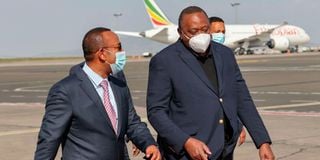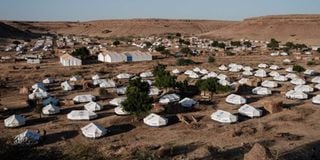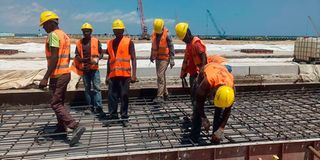Premium
Ethiopia conflict: Kenya fears economic shocks

President Uhuru Kenyatta and Ethiopian Prime Minister Abiy Ahmed are pictured at Bole International Airport in Addis Ababa on June 8, 2021.
Kenyan officials fear expanded skirmishes in Ethiopia could hurt planned economic projects between the two countries, even though the conflict, for now, is seen as distant.
As pressure mounts on Ethiopian warring parties in the Tigray region to lay down arms, Kenyan officials say they only predict a burden on Nairobi if the conflict continues and expands in Ethiopia, slowing down projects such as the Lamu Port South Sudan Ethiopia Transport (Lapsset) corridor.
This week, USAid Administrator Samantha Power pressured Addis Ababa and the Tigray People’s Liberation Front (TPLF), that have been fighting since November, to ensure a humanitarian corridor by laying down the arms and ending atrocities.
Many refugees
But while Kenya shares the call for a ceasefire, officials say the conflict could rope in neighbours in hosting displaced people and suffering delays on projects.
“The fear (for Kenya) is the spread of this particular conflict to the southern part of the country because that will mean many refugees will flow into our country, alongside weapons, which is a great concern,” Gen Robert Kibochi, the Chief of Defence Forces told Nation.africa on Thursday.
“We have been raising this issue with the Nile basin countries so that there is some kind of intervention, whether diplomatic [or otherwise[. There has to be some kind of intervention because Ethiopia, with a 100 million-plus population, is hugely strategic."
More on this: Gen Kibochi: Why Kenya is tense over Ethiopia war
The conflict, pitting the TPLF against Ethiopia National Defence Forces and allied regional militia, began last November when Addis Ababa launched what it called a law enforcement operation.
It has largely remained in northern parts of Ethiopia, although TPLF has attacked Amhara and Afar regions, and other regions deployed militia.
For now, the burden of refugees may be distant as Sudan has taken in more than 900,000 people fleeing the conflict. But Kenya’s interests in projects like Lapsset mean it has to rely on a stable Ethiopia for the Lamu port project to remain feasible.
George Mucee, an immigration consultant in Nairobi, told Nation.africa that a sustained conflict in Ethiopia could make it less attractive to investors, granting neighbours like Kenya an advantage on FDI. But that, he argued, will also come with a burden.
“Certainly, with the ongoing uncertainty and near civil strife in Ethiopia, grand projects like Lapsset will suffer and be in limbo for a while,” Mr Mucee, CEO of George Mati Mucee Consulting, said on Wednesday.
“Instability in Ethiopia creates security and humanitarian crisis in Kenya and other countries. We are likely to see an influx of refugees from Ethiopia,” he added.
Ethiopia’s economy had been growing, on average, at six percent before Covid-19 reached its shores in early 2020. It received $2.5 billion worth of Foreign Direct Investment (FDI) in 2019, according to the Unctad, raising its FDI stock to $25 billion.
There has been no assessment on the impact of the conflict on FDI, although Ethiopia itself said in July it will need $2.3 billion to rebuild destroyed infrastructure in Tigray, due to war.

Um Raquba refugee camp in Sudan's eastern Gedaref state, which hosts Ethiopian refugees who fled the Tigray conflict.
Possible sanctions
Western countries including the US have been threatening economic sanctions on key leaders in Ethiopia, which could hurt viability of the country for investment.
Kenya, on its part has opposed any type of economic pressures on Ethiopia, arguing it could in fact create a new problem for the region.
“Countries applying financial pressure on the government must reverse course to not create an economic catastrophe. Instead, they should commit to work with Ethiopia and the region in facilitating national dialogue and putting in place economic relief packages that give the Ethiopian people hope,” Foreign Affairs Principal Secretary Macharia Kamau and Dr Martin Kimani, Kenya’s Permanent Representative to the UN, argued in a joint Nation.Africa commentary on August 1.
The two diplomats said Kenya will continue to defend the need for 'African solutions’ in dealing with the Ethiopian crisis, swatting away intervention by world powers. But they said Ethiopians must work for a solution before it is too late.
“We will always stand with them but we also need them to reach out and make use of our goodwill and brotherliness. This is what needs to happen if we are to work together to bring Ethiopia back to being an exporter of peace that is at peace with itself,” they said.
Big business
Kenya had recently gotten access to the Ethiopian market after a consortium led by Safaricom won an $800 million licence to launch a telecom operator in an investment worth $10 billion in a decade. That investment will require open financing channels from the US and sanctions could hurt the possibility.
With Ethiopia relying heavily, 95 percent, on Djibouti for imports, Kenyan officials see Lamu port, which launched its first two berths in June, as a crucial to provide alternatives to Ethiopia’s import routes.
“Lapsset forms part of Ethiopia’s key transport solution. Addis is committed to making Lapsset a success because it offers Ethiopia options alongside the Djibouti, Somalia and Eritrean ports,” said Dismas Mokua, a political risk analyst for businesses in the east African region.

Casual labourers at work at a Lapsset site in Kililana, Lamu West, in this file photo.
According to him, there is little risk of the projects collapsing as both countries see Lapsset as a critical route.
“Nairobi maintains a strategic and mutually beneficial relationship with Addis, making Lapsset a sure bet in the event of unavailability of other ports. There is zero risk. In any event, businesses thrive even in war,” he told Nation.africa on Wednesday.
Officially, the Ethiopian government assures continuity in economic ties, but a main railway line linking Ethiopia and Djibouti was recently closed for nearly a week after regional forces in Afar crossed into neighbouring Somali region and launched attacks.
The two militia groups had been allied to the ENDF, but have had long-running differences between them, including an administrative border dispute.
Somali regional government spokesperson Ali Bedel said the attacks were carried out in Somali's Sitti zone of Gedamaytu and Gabraiisa areas, leading to at least 300 deaths. A meeting of elders from both sides saw the route reopened on Tuesday.
The 752-kilometer Ethio-Djibouti railway line, built by the Chinese at $3.4 billion, has been providing passenger and freight transport since January 2018.






